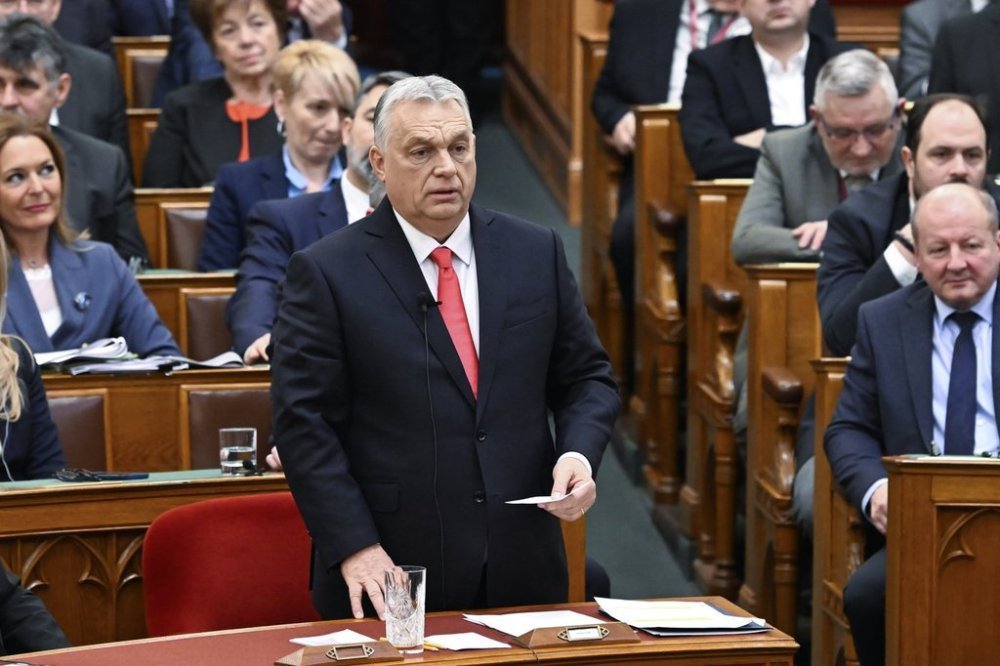Hungary’s leader orders price controls on basic foods as inflation spikes
Advertisement
Read this article for free:
or
Already have an account? Log in here »
To continue reading, please subscribe:
Monthly Digital Subscription
$0 for the first 4 weeks*
- Enjoy unlimited reading on winnipegfreepress.com
- Read the E-Edition, our digital replica newspaper
- Access News Break, our award-winning app
- Play interactive puzzles
*No charge for 4 weeks then price increases to the regular rate of $19.95 plus GST every four weeks. Offer available to new and qualified returning subscribers only. Cancel any time.
Monthly Digital Subscription
$4.99/week*
- Enjoy unlimited reading on winnipegfreepress.com
- Read the E-Edition, our digital replica newspaper
- Access News Break, our award-winning app
- Play interactive puzzles
*Billed as $19.95 plus GST every four weeks. Cancel any time.
To continue reading, please subscribe:
Add Free Press access to your Brandon Sun subscription for only an additional
$1 for the first 4 weeks*
*Your next subscription payment will increase by $1.00 and you will be charged $16.99 plus GST for four weeks. After four weeks, your payment will increase to $23.99 plus GST every four weeks.
Read unlimited articles for free today:
or
Already have an account? Log in here »
Hey there, time traveller!
This article was published 11/03/2025 (306 days ago), so information in it may no longer be current.
BUDAPEST, Hungary (AP) — Hungary’s government will limit the profit margin for grocers on a number of basic food items, the prime minister said on Tuesday, a response to growing inflation hitting consumers in the Central European country.
Prime Minister Viktor Orbán said in a video on social media that commercial grocers must limit their markup to no more than 10% of wholesale price on 30 different food items, a policy that would be in effect from mid-March until the end of May, but could be extended.
He said that the government would monitor grocers’ compliance with the policy, but didn’t specify which foods would be included in the requirement.

“In order to curb excessive and unjustified price increases, we have been negotiating with representatives of commercial chains in recent days,” Orbán said. “Unfortunately, the vendors’ offers fell far short of our expectations.”
Inflation data released Tuesday by Hungary’s statistical office showed an annual inflation rate of 5.6% for February, while food prices were up 7.1% on the year. By contrast, average inflation in the 20-member eurozone was 2.4% in February, according to the European Union’s statistical office Eurostat.
Hungary, which isn’t a member of the eurozone, uses the forint as its national currency.
The data came as an “unpleasant inflation surprise” for Hungary, which “indicates increasing price pressure in the Hungarian economy with regard to more permanent inflationary trends,” Orsolya Nyeste, a macroeconomic analyst with Erste Bank, wrote in a note on Tuesday.
Hungary has frequently led the EU in inflation in recent years as a cost of living crisis has gripped the country. The populist government has pointed to external factors such as the war in neighboring Ukraine and EU sanctions against Russia to explain the yearslong inflation spiral, though prices in other regional countries like Poland, Romania and Slovakia haven’t risen nearly as steeply.
Extreme jumps in food prices — peaking at more than 45% at the beginning of 2023 — have spurred previous government interventions in Hungary that included price caps on a number of food items as well as fuel at filling stations. But some critics and economists argued that sellers simply raised prices on other products to make up for shortfalls caused by the price controls.
The inflation numbers present a challenge for Orbán as Hungary’s economy continues to struggle before a national election in 2026. The EU’s longest-serving leader, in power since 2010, faces a challenge from a new party that has placed the stagnating economy and cost of living issues at the center of its political platform.
Compounding Hungary’s difficulties, the EU has withheld billions in funding from Budapest because of concerns over judicial independence and rule-of-law standards.

